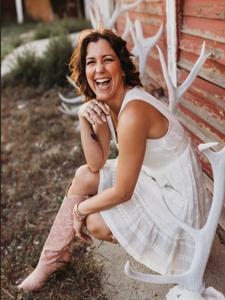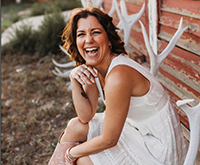Prairie Wife of the Week January 3, 2014
Posted January 3, 2014 by Prairie Wife -
I met Elizabeth several years ago through a college friend. As I learned more about Elizabeth I was inspired by her desire to right the wrongs in this world. How many times are we struck by something that we see wrong in our community, and simply shrug our shoulders and put it in the back of our minds? Elizabeth did what most of us will never do; she left everything behind and flew across the world to aid the forgotten and neglected women and children of Africa. Her grit and determination to change the world make her a perfect Prairie Wife of the Week.
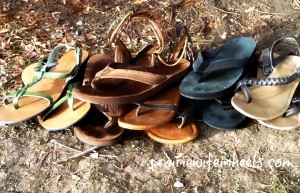
Prairie Wife (PW): So tell me a little bit about yourself.
Elizabeth (E): I was born in Wheatridge, CO but I grew up in Broomfield, CO. I went to college in North Carolina, I graduated with a degree in Human Services. I have worked for Hope House of Colorado as a GED career specialist as well as a GED teacher for Denver County Jail. I am currently a curriculum developer in Northern Uganda.
PW: Why, and when, did you first felt moved to go to Northern Uganda?
E: I first felt called to go to Africa when I was 15, that’s when I first started to feel the urge to travel there. 15 years later I took my first trip to Africa, and I worked in an orphanage in Sudan.
PW: What led to you being able to go there the first time?
E: I had a coworker at Hope House who had traveled to Sudan when she was a teenager. She was planning on traveling over there again and asked me if I would be interested in traveling with her. I decided to go. My first and largest hurdle was raising the money for the trip. Because I wasn’t going through any organization, I was responsible for all the expenses for the trip.
PW: What are the monetary responsibilities?
E: I had to raise $3,000. That was for the flight to Africa, room and board when I was there, and then food. I also had to pay for shots (typhoid and yellow fever) and medicine (malaria pills). I raised all of the money by asking people I knew through letters to donate. I feel like people were so generous because they knew this was something that had been in my heart for a long time.
PW: What was your first impression when you got to Africa?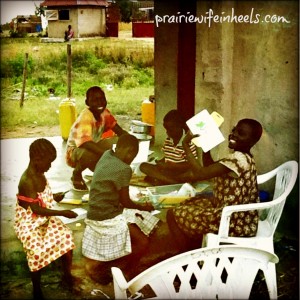
E: I hated it! I hated it because I was absolutely shocked by the poverty compared to what I was accustomed to in America. There is trash everywhere and the majority of people lived in huts made of clay. The classrooms are one room with no windows and most of the students sit on the dirt floor or crowded benches. They eat beans and rice almost every single meal every single day. There are of course clean water issues. There are people walking everywhere, children and adults with no shoes. I was struck by the contrast between the abundance of material possessions we have here in America versus the lack of what we consider basic necessities. For example we have a kitchen full of pots and pans and dishes. The average family has a few bowls and they cook over a fire. But, after my third day there, something just changed in my heart and I fell in love with it all! Now I realize it was just my perception of wealth that needed to change.
PW: What was your goal for your first trip to Africa, what was your day to day life like?
E: I spent my time at an orphanage that had on average 60 kids. It was staffed by a Director, a Matron, two part time cooks, and a Pastor. I felt that I could help the most by spending time with the kids. I didn’t teach them or give them lessons. We just played with them and listened to them, all the things that children with families have and take for granted. I was there for 3 weeks and I knew that I had to find a way to come back to Africa.
PW: So then what did you do?
E: I worked extra jobs and did all that I could to earn enough money to go back to Africa. I originally wanted to move there 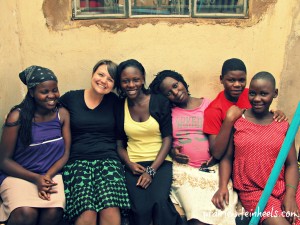 permanently but the timing didn’t work out. On my second trip, I went to Kampala, Uganda for two weeks. This time I worked with unwed expectant mothers and their babies. Unwed mothers have a hugely negative stigma over there. They are not allowed to attend school, or even go back to the same school after the birth of the baby. Often the girls are raped and the pregnancies are a product of this horrible crime, and nothing happens to the men who have committed the crime. The girls are abandoned by their people and sometimes their families disown them. The organization I worked with provided shelter and care for the pregnant girls, and then for the new mothers and babies. They provided unconditional love. One family we knew decided to allow their daughter and her baby to live with them. But it became so stressful on the family, that the grandmother killed the baby. I know that tragedy happens here in America too. But rape is so socially acceptable over in Africa that it can be overwhelming. Communities just look the other way.
permanently but the timing didn’t work out. On my second trip, I went to Kampala, Uganda for two weeks. This time I worked with unwed expectant mothers and their babies. Unwed mothers have a hugely negative stigma over there. They are not allowed to attend school, or even go back to the same school after the birth of the baby. Often the girls are raped and the pregnancies are a product of this horrible crime, and nothing happens to the men who have committed the crime. The girls are abandoned by their people and sometimes their families disown them. The organization I worked with provided shelter and care for the pregnant girls, and then for the new mothers and babies. They provided unconditional love. One family we knew decided to allow their daughter and her baby to live with them. But it became so stressful on the family, that the grandmother killed the baby. I know that tragedy happens here in America too. But rape is so socially acceptable over in Africa that it can be overwhelming. Communities just look the other way.
PW: What was your next step after your two weeks were done?
E: I originally planned on going back and working with this community, but it didn’t work out. I was upset with the whole situation, and frustrated. My brother told me that I just needed to find a way to be in Africa if that is what I felt called to do. I contacted the orphanage that I had originally visited. I offered myself as a volunteer to come and work for them, salary free. I left in May of 2012 and I worked and lived there for 11 months.
PW: How did this trip impact you, what were some of the bigger moments for you?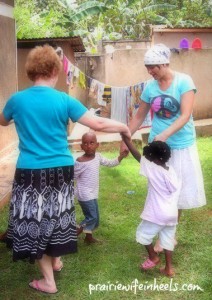
E: Through my time there I really learned that what I considered necessities aren’t really important. A nice house and new shoes, name brand shampoos, these things don’t matter. Most of the people have food and clothing. Once I realized that things aren’t what is important I was more able to focus on what the children really needed- love and attention.
What I feel the people are lacking is “spiritual food” the moral corruption is what needs to be changed. The lack of education for women and children is staggering and I feel called to try and change it. I understand that teaching them basic skills such as tailoring, will help them to provide for their families, but it won’t help them to charge ahead and above to create a better future for themselves and for their country.
PW: What can we do to help?
E: First and foremost prayer, for the people, the government and the volunteers. People are so afraid to go against tradition, so I pray that they will overcome their fear. Of course, monetary support is necessary for all the people who volunteer and offer support and services. I am currently helping to develop a curriculum to use for children preschool to 7th grade, and we hope to eventually develop it for high school as well. The education system in Northern Uganda and South Sudan, barely covers what we consider the basics. We hope that with our curriculum we will create children who have a strong background in reading, writing, and math as well as an ability to ask questions and make decisions based upon facts and knowledge, rather than fear and survival.
PW: Any last Prairie Wife words of Wisdom?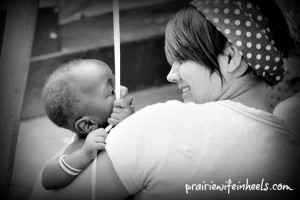
E: “Our lives begin to end the day we become silent about things that matter.” Martin Luther King Jr.
If you would like to help Elizabeth please visit http://einafrica.wordpress.com/
As always our Prairie Wife of the Week will be stopping by to respond to any questions and comments!
Categories: Prairie Wife of the Week
Tags: , Africa, aid, orphans, Prairie Wife of the Week, rape, support, Woman's home
Previous Post « Happy New Year To Me (sarcasm)
Next Post The Winter Blues »
